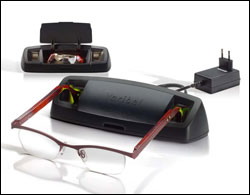New Dutch invention: Varibel, the glasses that hear

These hearing-glasses are called ’Varibel’ and offer older people the chance to stay active longer - free from the aesthetically unpleasing and technologically limited traditional hearing aids. In each leg of the glass’ frame there is a row of four tiny, interconnected microphones, which selectively intensify the sounds that come from the front, while dampening the surrounding noise. The result is a directional sensitivity of +8.2 dB. In comparison, regular hearing aids have a maximum sensitivity of +4 dB.
Today a new hearing aid in the form of a pair of glasses was unveiled. These hearing-glasses are called ’Varibel’ and offer older people the chance to stay active longer – free from the aesthetically unpleasing and technologically limited traditional hearing aids. Delft University of Technology in the Netherlands originally developed the hearing-glasses. Varibel developed these glasses into a consumer product in partnership with Philips, Frame Holland, the design agencies MMID and Verhoeven, and others.
Approximately 1,265,000 people in the Netherlands over the age of 60 are hearing impaired. Of these, half 22% (or around 275,000 people) use a hearing aid, but it is not always possible to hear others well if there is surrounding noise. Many hearing aids intensify sounds from all directions. The result is that people hear noise, but not the people they are speaking to. Because people have such difficulty understanding what others are saying, many people – in spite of their hearing aid – have less social contact with others or must retire from their jobs earlier than desired. The hearing-glasses can provide a solution to this problem, say the experts and users who have tried and tested the Varibel.
The Varibel cannot be compared to traditional hearing aids. In each leg of the glass’ frame there is a row of four tiny, interconnected microphones, which selectively intensify the sounds that come from the front, while dampening the surrounding noise. The result is a directional sensitivity of +8.2 dB. In comparison, regular hearing aids have a maximum sensitivity of +4 dB. With this solution, the user can separate the desired sounds from the undesired background noise. Dr. Cor Stengs, ENT specialist involved in the clinical tests, said of the Varibel: “Practical experience with the hearing-glasses supports the theoretical claims that the ability to understand speech is much better. There is a significant improvement in the sound quality.”
With Varibel, natural sounds can still be heard. This solution allows people to hear naturally and clearly in the direction in which they are looking. This has great advantages for daily life. Martin de Jong, audio-technician, says: “With the Varibel, the natural sounds that people enjoy are retained. This works surprisingly well. People can hear good and at the same time clearly – and especially in rooms such as in a cafe or at a birthday party.”
The development of Varibel was made possible by a developmental loan from the Dutch Ministry of Finance. The STW Technology Foundation financed the research of the Delft University of Technology on the hearing-glasses and supported Varibel with the development of patent protection.
Media Contact
All latest news from the category: Medical Engineering
The development of medical equipment, products and technical procedures is characterized by high research and development costs in a variety of fields related to the study of human medicine.
innovations-report provides informative and stimulating reports and articles on topics ranging from imaging processes, cell and tissue techniques, optical techniques, implants, orthopedic aids, clinical and medical office equipment, dialysis systems and x-ray/radiation monitoring devices to endoscopy, ultrasound, surgical techniques, and dental materials.
Newest articles

Trotting robots reveal emergence of animal gait transitions
A four-legged robot trained with machine learning by EPFL researchers has learned to avoid falls by spontaneously switching between walking, trotting, and pronking – a milestone for roboticists as well…

Innovation promises to prevent power pole-top fires
Engineers in Australia have found a new way to make power-pole insulators resistant to fire and electrical sparking, promising to prevent dangerous pole-top fires and reduce blackouts. Pole-top fires pose…

Possible alternative to antibiotics produced by bacteria
Antibacterial substance from staphylococci discovered with new mechanism of action against natural competitors. Many bacteria produce substances to gain an advantage over competitors in their highly competitive natural environment. Researchers…






















Where are these available in the United States?